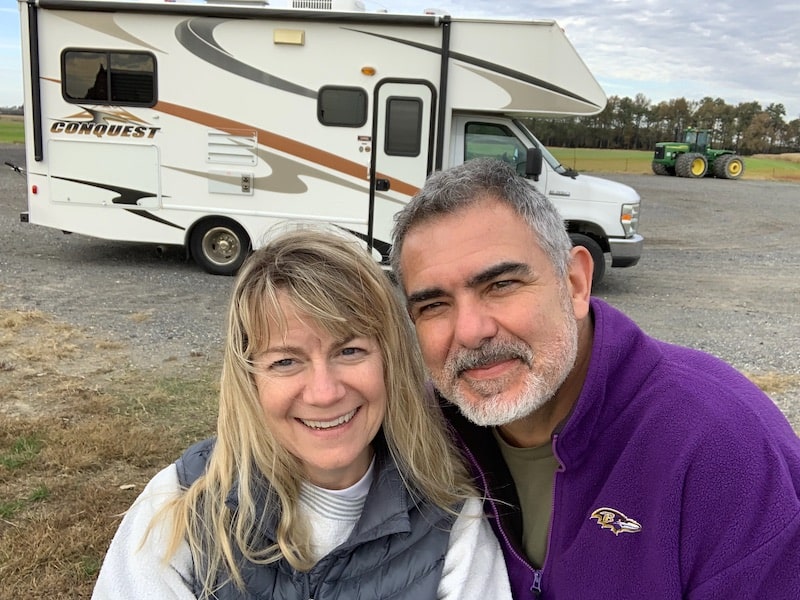Thanks for your support! If you make a purchase using our links in this article, we may make a commission. And, as an Amazon Associate, I earn from qualifying purchases. See the full disclosure here.
Here at RVBlogger, we keep receiving the same question, What do I need to know before living in an RV? We do our best to answer everyone’s questions but realized that we needed to answer the question the right way. So we came up with our list of 19 Pro Tips for RV Newbies which are:
1. Educate Yourself
2. Rent Before You Buy
3. Buy Used and Save Money
4. Camping Memberships Reduce Trip Costs
5. Get the Proper Gear
6. Connect With Others In the RV Community
7. Use The Best Trip Planning Tools
8. Don’t Rely On Waze or Google Maps for Your GPS
9. Use a Good Campground Review Site
10. Reserve Your Campsite As Early As Possible
11. Protect Your RV With the Proper Equipment
12. Make Your RV and Vacation Kid-Friendly
13. Pet-Friendly is a Two Way Street
14. Be Prepared For Bad Weather
15. Plan Your Packing
16. Invest in Good Outdoor Furniture
17. Plan a Great, but Realistic Menu
18. Be at One With The Outdoors…Except for the Bugs
19. Maintain the RV Community Reputation
We decided to put together the most meaningful questions and provide you with the best answers. We’ll give you multiple points of view. You will learn from experts in the field, and we’ll also give some solutions from your fellow RVers who are friends of the RVBlogger Community.
RV manufacturers battened down the hatches and prepared for the worst as the COVID-19 pandemic swept over the world. With the entire population in lockdown, they expected the worst fiscal year ever. Yet the exact opposite happened.
With a few well-placed articles in some of the most reputable media sources and many online blog data, the surge of new RV consumers has reached unparalleled levels. RV companies are working hard to catch up to the massive list of orders flooded their inboxes.
19 Pro and Veteran Tips for RV Newbies
1. Educate Yourself
“We went to a show pre-covid. Great opportunity to see many brands and floor plans on the same day.” – Kate Bartlet (8/19/20)
There’s a lot that goes into the RV lifestyle. No one expects you to learn it all in a day or study it like a college course. The best way to do this is to watch RV orientation videos on subjects that matter most to you. A great place to start is the RVBlogger Courses section on our website.
You’ll learn from a 20-year veteran who has experience in sales, service and is an RVer himself. Each video has multiple chapters and downloadable materials that fit your specific needs. You can buy them individually or as a bundle set designed around your RV category.
- Buy the Right RV and Save Thousands- Learn how to narrow down the search to find the perfect RV for your needs and wants.
- RV Rental Orientation– The instructor walks you through setting up an RV, towing techniques, and other tips essential for a successful first time trip.
- Travel Trailer Towing Basics- This course takes a lot of the guesswork out of towing. Important aspects like matching a tow vehicle to your RV, tow weight ratings, and mastering driving techniques.
- Travel Trailer and 5th Wheel Orientation– Find out the pros and cons of these two categories. By the end of this course, you’ll have a good understanding if your a travel trailer or 5th wheel RVer.
- Tow Your 5th Wheel Like a Pro– You’ll learn how to choose the right truck, maneuver correctly, and braking skills to master 5th wheel towing.
- Motorhome Orientation and Training– Your RV dealer may have walked you through all of the buttons, but how much of that did you retain? This video takes you through all of it at a comfortable pace.
- Drive Your Motorhome Like a Pro– Learn to drive like a commercial professional. You’ll gain insights from some of the best drivers on the road when it comes to turning, braking, and backing up.
- RV Care and Preventive Maintenance– Like any investment, you want to keep it in the best shape possible. This course shows you how to care for your RV with simple maintenance.
- Winterize and Store Your RV– When it’s time to store your RV for the winter, this course walks you through the winterization process that keeps your RV safe during the freezing temperatures.
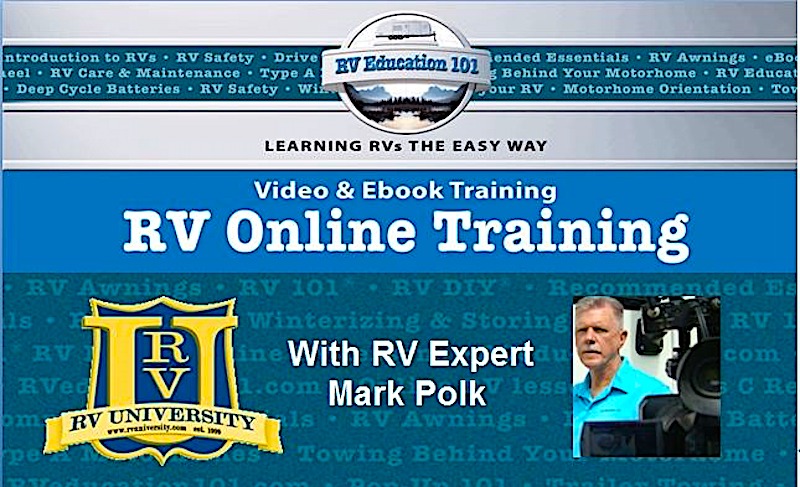
2. Rent Before You Buy
“I would rent a couple first. I [ended up buying] my 3rd pick. Renting is a great option for trying them out!” – Paula Noll (8/19/20)
There are over 200 different RV manufacturers worldwide. Each manufacturer has numerous floorplans, different lengths, and each has its defining factors. If you search for the top 10 best RV manufacturers or worst RV brands, you’ll receive results in the hundreds of thousands where each article has a different argument. How are you supposed to decide based on that?
When you buy an RV, it’s one of the most significant investments you’ll make next to a house. Like a car, as soon as you drive it off the lot, the depreciation “meter” starts winding down. So you’re always asking yourself which RV is right for me during the shopping process.
The best way to find out is to rent some. Peer-to-peer RV rental companies like Outdoorsy, RVezy, and RVshare allow you to rent RVs from every category and every type of floorplan out there.
Real people own these RVs. It helps them out by not letting their RV sit, and they earn a little extra income. When you pick up the RV, the owner will orient you with all of the setup procedures and functions of the coach. They’ll also answer any questions you may have to give you the best chance for a successful trip.
Both peer-to-peer companies have one-way and pet-friendly rental opportunities. You can rent for a weekend, a week, or longer. Make sure you check out our YouTube video on how to rent from Outdoorsy and take advantage of the discount code.
For example, let’s say you’re interested in buying a (35-40 foot) travel trailer, but you’re unsure which one will fit your needs and wants the best. To maximize your rentals, you rent four of your favorites on different weekends with the floorplans you like. You choose a Grand Design bunkhouse, a Jayco rear kitchen, a Forest River toy hauler, and a Heartland non-slideout master suite.
After the four rentals, you decide that you like the Heartland the best. Since you’ve also had the opportunity to try out the various floorplans, you and your partner/spouse debate the pros and cons. Once you’ve decided, you head down to the RV dealership and choose your perfect RV.
You’ve spent around $2,000 on the rentals and everything involved, but look at the full picture. You now have practical knowledge of the brands and floorplans. In your conversations with the owners and others at the campgrounds, you were able to gain wisdom from them about pricing, realities, and many other things you didn’t know before. You also had first-hand experience with the facts of setting up and breaking down.
3. Buy Used and Save Money
“… take your time and make sure it’s in good shape. Many times it’s smarter to go used.” – Darrel White (8/13/20)
If you want to justify buying a travel trailer from a financial point-of-view, don’t even try. RVs depreciate quickly and as much as 20% a year. There’s a reason why they’re called recreational vehicles.
If you want to experience unique adventures, have the best family memories, and enjoy life in ways that fulfill that part of your soul you didn’t know were missing, that’s why you buy an RV.
As a buyer, you can take advantage of the depreciation. RVs that are well taken care of will last years. A five-year-old RV will cost significantly less than a brand new version. For example, on an RV sales website, a 2020 Fleetwood Flair is listed for $89,900. A 2015 Flair, listed for $52,900, has the same measurements, features, and only 8,000 miles on the odometer. Assuming the older model has a clean RV inspection, this “diamond in the rough” is a great opportunity.
Just be sure and get a good extended warranty for your rig. Susan and I use Wholesale Warranties and highly recommend them because we have no mileage restriction and their consequential damage coverage is awesome! You can learn more about them in our article called Protecting Your Travels with RV Warranties: What, How, and Why.
4. Camping Memberships Reduce Trip Costs
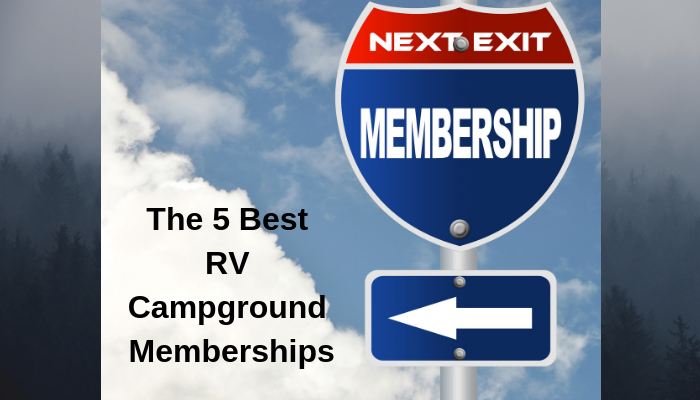
For RVs, the average campground fee can range between $30- $80 a night. Rates depend on:
- Time of year
- Weekday versus weekend
- Holidays
- Hookup utilities (partial or full)
- Parking conditions (dirt or leveled cement pad)
- Premium location (close to tourism location or remote area)
There are ways to manage these costs through camping membership programs. Many organizations have created deals with campgrounds for discounted rates on overnight fees in exchange for increased patronage.
One of the top membership programs is Passport America. For $44, you can camp at any participating campgrounds for 50% off the standard rate in the entire United States, Canada, and parts of Mexico. Check out our video for our promo code for extra savings on the membership.
For those that need an alternative boondock space other than Walmart, Cracker Barrel, or other parking lots, Boondockers Welcome is a must-have app on your computer and mobile device. It allows fellow RVers to provide overnight space for traveling RVers free of charge.
It could be as simple as a driveway to park in, or as big as a 100-acre property with full hookups. If you need to stay in a particular area for a couple of days, many host families are happy to accommodate you. Check out our article for full details and our companion video for a great discount.
5. Get the Proper Gear
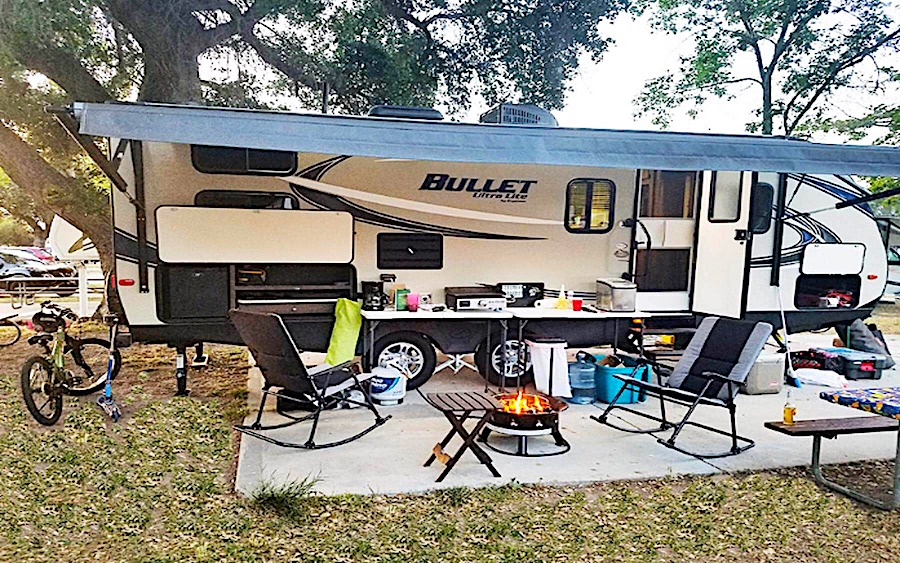
“I use a hitch mount that holds 2 bikes. It’s easy to hookup and very stable going down the road…” – Sam Schenck (8/18/20)
Everybody loves that feeling when you pull your RV into your driveway for the first time. That ”hey neighbor, check this baby out” feeling never gets old. We RVers are not the “competing with the Jones’” type, but we’re always the first to congratulate someone on their new rig. We also want the grand tour to see the new “big pretty” in the campground.
Of course, now that you have your RV, there’s a whole list of things you’ll need to operate it properly. While that RV dealer’s gift set of hoses and other items was a nice incentive, you don’t want to find out the hard way why that 6-foot sewer hose isn’t going to be suitable for your needs.
You can check out our RVBlogger Gear page to see what we use both inside and out for our class C motorhome. Much of it, like our various hoses, short queen sheets, and other items you’ll find relevant to your RV. We provide links to the websites that we purchased them.
For other gear, check out our 8 Best Places to Buy RV Accessories and Supplies article. These stores have excellent online pages you can shop, and it’s easy to have your gear sent to wherever you are at the time if you’re traveling (make sure the campground is willing to accept packages for their guests before you order anything). These stores include:
- Amazon
- Camping World
- Chewy
- REI
- TechnoRV
- Tochta Mattresses
- Vintage Trailer Supply
- Walmart
6. Connect With Others In the RV Community
“Thank you all so much for your input! It has been a great help and encouragement to us just being able to interact and having so many reach out to help. Definitely going to pay it forward! Thanks again!” – Ashley Marie Haynes (8/17/20)
The quote above is the perfect example of how the RV community looks out for each other. This young couple broke down while on an RV trip. Desperate for help, she reached out to the RV Camping for Newbies Facebook Page for guidance.
Everyone who had useful information jumped in on the thread with information to help them. If someone didn’t have mechanical tips, they were there to send supportive messages of positivity and hope. Through those efforts, and the husband’s mechanical background, they were back on the road to safety.
Whether it’s done virtually or around a campfire, RVers help each other out. We learn from one another, laugh with each other, and share incredible moments (that get magnified each time we share the story with others).
Join as many RV communities as you can. Don’t just stick to the online versions, become members of camping clubs. Talk to people at RV shows and join in on campground special events.
One friend of RVBlogger told us that the people in the camping club he grew up in became so significant to his life; he considers them aunts and uncles. He and his wife are full-time RVers now that he’s in his 40s. He feels he’s continuing his camping family’s legacy by educating others and keeping the traditions they taught him. The RV community is significant to those that have a passion for it.
7. Use The Best Trip Planning Tools
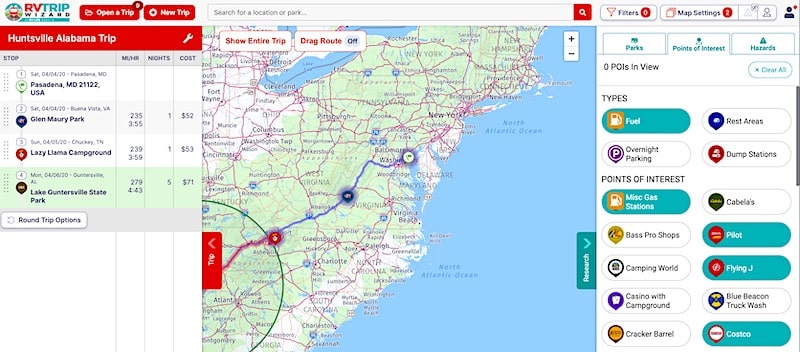
When you fly or take a cruise, planning your trip has a destination focus. The place you’re staying, what you’re going to do, and the airline you plan to take.
RV trip planning is different. The traveling part is just as important as the destination. Whether you’re towing or driving, maneuvering your RV into an RV-friendly gas station aisle is more accessible than a smaller neighborhood version. Not all Walmarts or other “big box” stores allow boondocking in their parking lots. Using the best RV road trip planner tools are the key to a successful trip. Tools like:
Each of these websites provides information about campgrounds, gas stations, and other essential services to RVers while traveling. Go Pet Friendly helps you find activities and veterinary services in case your four-legged family members need help.
If you want to learn more about RV Trip Wizard or The Dyrt Pro, view our videos and read our articles for all the details and discount codes.
8. Don’t Rely On Waze or Google Maps for Your GPS
Waze and Google Maps have become essential for urban life. Getting around town with these GPS mapping tools is accurate and very user-friendly. Now that passenger vehicles are required to have backup cameras; automakers are adding GPS maps almost as a standard feature (basic trim levels don’t offer it).
For the RV traveler, Google Maps and Waze don’t have the features we need to navigate today’s roadways successfully. Google Maps updates its maps every 3 years or longer. Rural areas don’t get the attention that cities receive, so accuracy is problematic. If you’re in a cellular dead zone for a while, you could miss your turn.
Using an RV trip planner apps is always a good idea since many of them have an offline mode. Of course, you should always have your Luddite backup atlas handy. The great thing about hard print atlas is they aren’t affected by dead zones and are very accurate.
9. Use a Good Campground Review Site
Before the internet, people in the RV community learned about the best RV campgrounds through word of mouth or direct experience. Campground review websites give RVers the ability to see what a location has for amenities, their rules, and how other campers rate their experiences at a particular place.
We highly recommend The Dyrt. Even with their free membership level, this peer-to-peer driven review website has over one million retrospectives from fellow RVers. Their listings give you a lot of information. Learn more about them with our article and video.
10. Reserve Your Campsite As Early As Possible
2020 is turning out to be the biggest year in RV history. Campgrounds are having to turn people away because they are full. Our best advice is to book as early as you can. Join a campground membership club to obtain a reduced rate to lock-in that reduced rate.
If you plan on staying at a public park, six months is how far in advance you can reserve national park campsites. State parks, county parks, and private parks will take reservations eleven months in advance.
If you’re in a situation where you need a campsite last minute, the best strategy is to call them directly or walk-in. There may be cancelations you can take advantage of, but have a plan B. You may be boondocking if you can’t find that last-minute opportunity.
11. Protect Your RV With the Proper Equipment
If you watch our Setup Checklist video, you’ll see why it’s crucial to have safety equipment between you and the campground utilities. For those that haven’t, we’ll give you a quick rundown.
Campground management does their best to maintain their property, but pipes age and wires degrade. Public authorities do require the campground to pass inspections, but those minimums may not meet your expectations. You want to protect your RV’s pipes from contamination and electric system from improper currents.
Using a multi-stage water filter will prevent sand and other contaminants from sneaking into your RV pipes. Surge protectors prevent overloads and underloads from burning out your electric system.
Spend the extra money on a good quality sewer hose and a container to keep it in. Many travel trailers let you store the hose in the back bumper to keep your storage bays clean. If that’s not the case, definitely get a plastic container to keep the dirty water it may have in it from contaminating your bay.
Some like to use thick rubber gloves when dealing with the sewer hose. Others prefer disposable latex gloves. We’ve designed an easy D.I.Y. sanitary station you can install on the back of your storage bay door to clean up after you’ve put the sewer hose away.
12. Make Your RV and Vacation Kid-Friendly
“Any time I took long road trips with my kids when they were little, I always brought a plastic tote with a bug catching kit, things to blow bubbles, magnifying glass, a soccer ball, toys for digging in mud/sand, hot wheels and mini plastic animals and buildings from the dollar store (I can’t tell you how many times they built farms and created stories using the characters and if they get lost, it’s not breaking the bank). My daughter has always been prone to mosquitoes something fierce so since she was a baby I put her rashguard clothing in the evening which is breathable, and there’s some good essential oil combos out there so you don’t have to worry about chemicals on the skin. Also applying to clothing vs skin helps.” – Selena Jones (8/13/20)
Selena makes a lot of great points. There are plenty of family-friendly campgrounds with playgrounds, water parks, and other kid-friendly events. You also want to plan activities for them that keep them busy. There are many websites, like Pinterest, with fun and educational things for them to do.
Making your RV safe for younger children isn’t a difficult task. You can find gates for loft spaces to prevent them from rolling off. Tub style showers are perfect for toddler bath time. Many full-time families will plan trips to national parks or specific locations that have educational qualities to them.
Why read about the Black Hills of South Dakota when you can visit Mount Rushmore National Park and experience the area itself? Each national park has educational material ready-made lesson plans to guide your children’s learning adventure. If you need a chalkboard, there are specific paints that turn your walls into dry erase markerboards.
13. Pet-Friendly is a Two Way Street
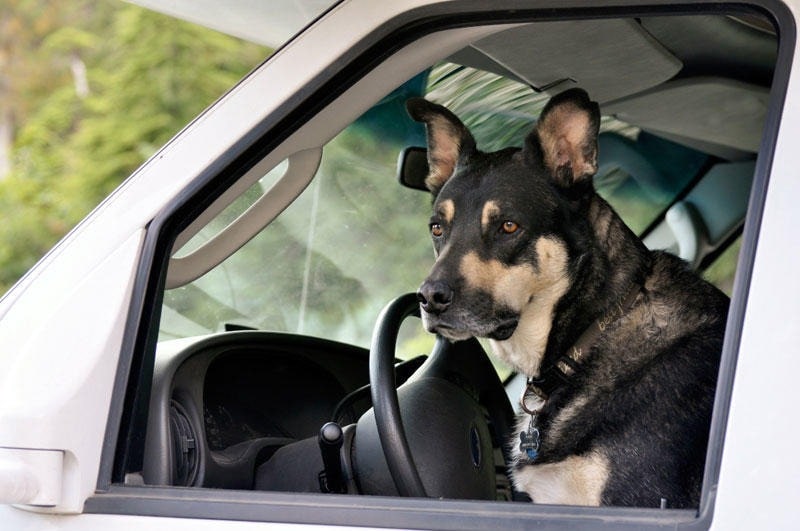
“…Make sure you have up to date shot records for when you check in.” – Heather Stock (8/6/20)
65% of all RVers bring their pets with them. 93% of those pet owners are dog people (sorry cats). When traveling with your dog, there are certain practices you should prepare.
- Bring original copies of their shot records, license paperwork, and a good picture of them.
- Always keep them on a six-foot leash outside.
- Clean up after them, even in the dog park
- Locate the nearest vet
- Keep them occupied to minimize barking.
The RV industry has listened to its consumers by creating certain features and coaches designed to be pet-friendly. Learn more in our article about traveling with dogs.
Meanwhile, remember other campers want to enjoy their experience. RV’s muffle sound, but don’t contain it. Dogs are the number one reason for noise complaints at campgrounds. Make sure you plan your trip with plenty of pet-friendly activities so they can enjoy their time away from home too.
14. Be Prepared For Bad Weather
”People plan, G-D laughs” – Anonymous
You may have a great vacation planned full of activities, but once you’re set-up, the rain clouds begin to build. As the rain starts to drop like the frustrating language in your head, it’s time to figure out how to salvage this trip indoors.
RVs have come a long way with interior features. The media features rival many home entertainment centers. Tables and countertops have multiple uses. Campgrounds now offer wifi services to their guests. Here’s what to do in your camper when it’s raining:
- Binge-watch your favorite shows or movies
- Tabletop board games are always fun
- Family-friendly game console games can show your kids how cool you are
- Have fun baking or cooking that new recipe you’ve wanted to try
- Find an indoor place in the area worth checking out
- Walk up to the campground’s main building and see what they have going on
- Grab your ponchos and rain gear for a wet weather hike
- Rainy days are perfect times to update journals or catch up on reading lists for school
- Plan your future RV trips
15. Plan Your Packing
For the RVer, what’s more valuable than time or money? Storage space.
Planning your packing strategy is essential. If you’ve ever watched Tiny House Nation on the FYI Network, you’ve seen many families make hard choices on what to keep and what must go. RVs work the same way. RV manufacturers do their best to find as much room as possible for storage, but their efforts are limited.
Your strategy should divide things into three categories: priorities, wants, and “if it fits.” Priority items would be kitchenware, tools, camping gear, and clothing. Wants and “if it fits” would depend on personal choices.
You can use some creative mods and hacks to add storage to your RV. Adding cargo nets in ceiling corners is a great way to add storage space for softer items. Cloth and plastic shoe trees can be cut to size and hung on the back of shower walls and cabinets to hold toiletries, towels, and other supplies.
16. Invest in Good Outdoor Furniture
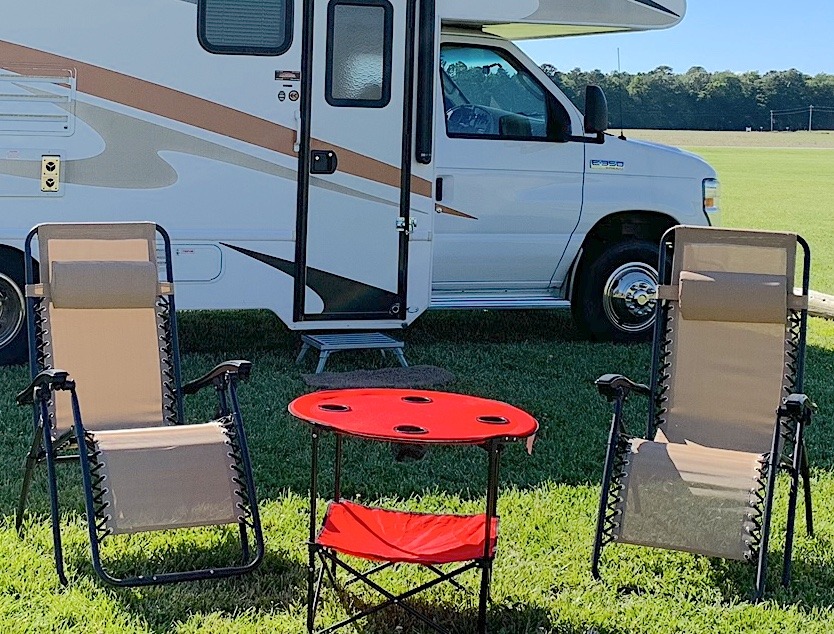
You should think of your outdoor space under your awning as another room. You can make it as simple or complex as you want. Investing in quality products that can resist outdoor conditions is worth the money. As the saying goes, “buy good once.”
Folding furniture like chairs, ottomans, tables, and other items can make your outdoor space comfortable and aesthetically pleasing. You’ll want something that’ll hold up as you spend many hours enjoying your time outside. The last thing you want is to be the person sitting around the campfire, and the chair gives out. Of all the campfire stories floating around the RV community, you don’t want to be apart of that one.
17. Plan a Great, but Realistic Menu
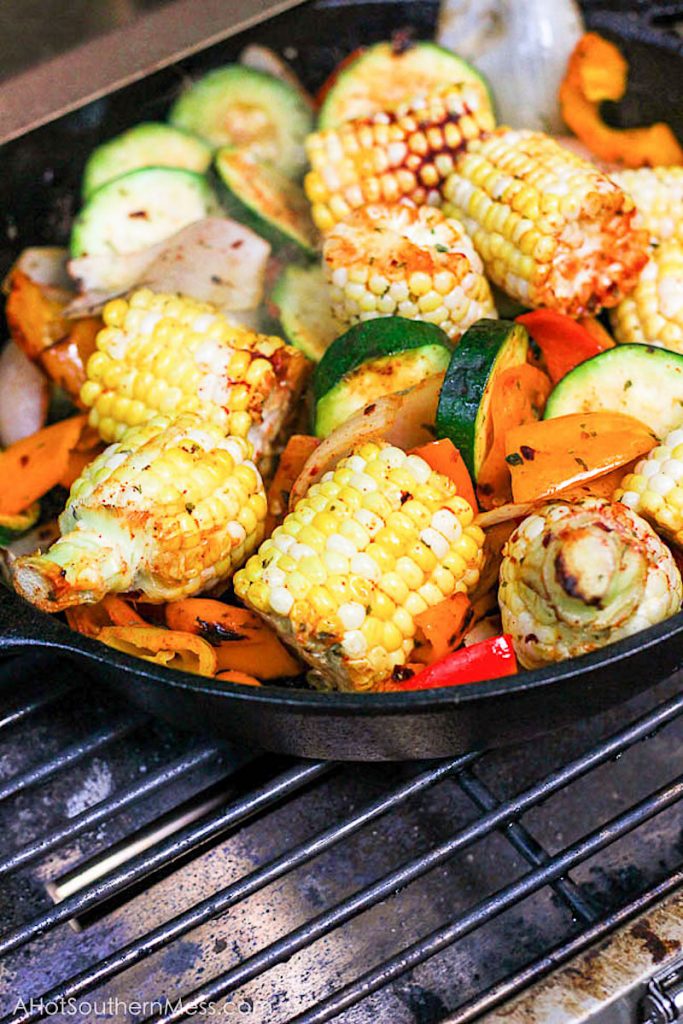
If you’ve seen that “what not to do” movie with Robin Williams, you know that the sewer hose doesn’t work that way. You also understand that roasting a full turkey in an RV oven is a bad idea.
RV stoves and ovens either run off of the propane tank or the DC electric system. They aren’t as powerful as a residential unit. There are many great recipes designed for RV kitchens that are healthy and taste great.
Many home recipes do translate well in an RV like casseroles, stews, and crockpot dishes. You can find many RV dishes over the internet that are simple to make and budget-friendly. Whether you want to try your hand at campfire foil meals or become the next RV Iron Chef, your family will love them. If you do find one that works out well, make sure you let us know on our RV Camping for Newbies Facebook Page under the “What’s on the Menu Monday.”
18. Be at One With The Outdoors…Except for the Bugs
Oh, the joys of the (thwack) outdoors. There’s nothing like (thwack) enjoying nature and getting away (thwack) from the city (thwack) life.
One of the great joys of RVing is enjoying nature. Unfortunately, mosquitoes enjoy us just as much. There are many different products on the market to protect us from insects that view us as their next meal..
The best way to keep mosquitos away while camping is a long debate with many different answers. You want to use products that aren’t harmful to yourself, the environment, and protect against other insects. Make sure you protect your pets as well. Ticks and fleas love to climb through your pet’s fur.
Protective clothing is always a good start. Use waterproof products since your sweat can weaken the protection. Avoid camping around water, and don’t leave your flashlight on too long since it attracts bugs.
If you’ve heard loading up on vitamin B-1 (thiamin) is a natural way to repel mosquitos, you may want to do some further research. The idea is that what does go through your pores creates an odor mosquitos don’t like. There isn’t any hard scientific research to prove this. Your body primarily expels this vitamin through your waste instead of your pores.
19. Maintain the RV Community Reputation
“…Treat others as you wish to be treated. Start from that point and you’ll be on the right track…” – R Michael Torrey (8/13/20)
If you remember nothing else, stick to the golden rule. RVers are known as friendly people who help each other out. Some walk a different path, but generally, we are altruistic.
- We always leave the campsite cleaner than we found it.
- We are responsible for everyone in our group.
- We know our actions and behaviors directly affect the next campers that use our campsite.
- No matter our political, religious, or other differences, we’re apart of the same community.
- We are a storytelling people (okay, we embellish for a little flair, but the message is the same).
The point is, we’re in this together. Never be afraid to ask for help. At one point the person you’re asking was in the same position you are. Allow them to pay it forward. One day, You’ll be on the other side of the conversation.
RVing is about people. During every major disaster in U.S. history, the RV companies and we were the first ones in the trenches helping out. That’s just who we are.

